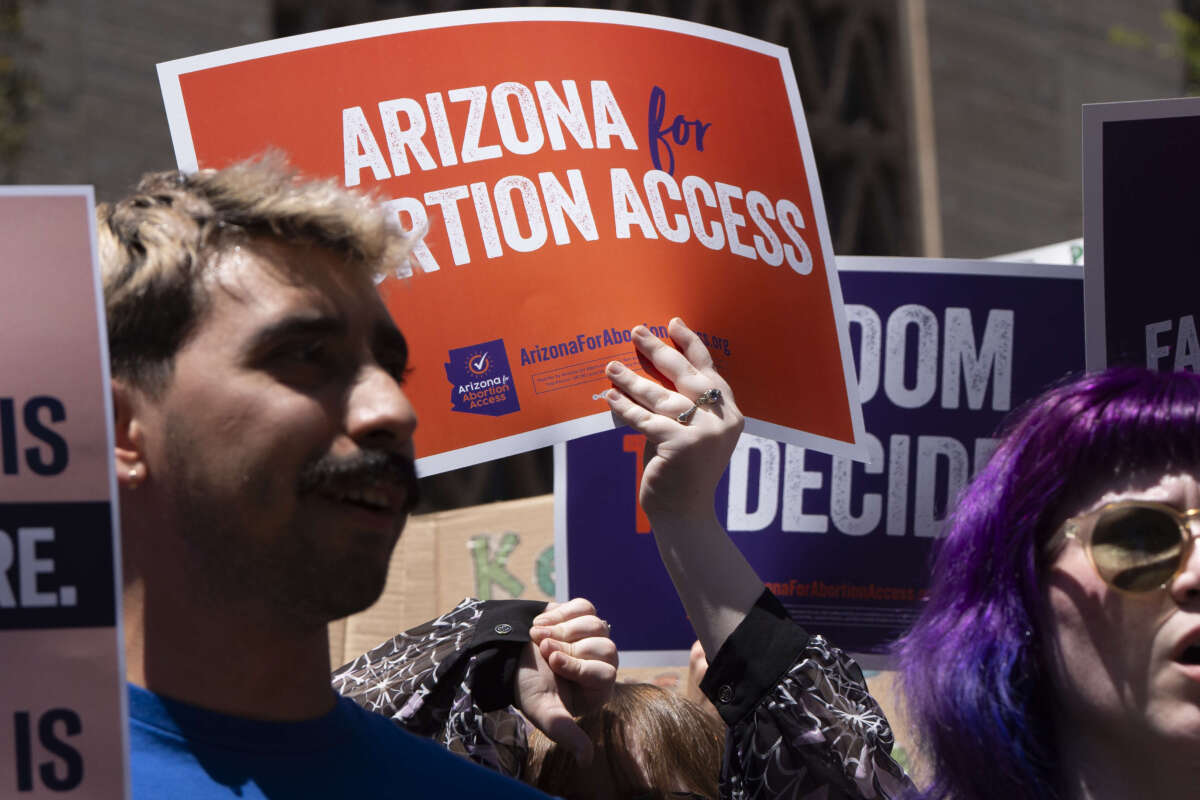The Arizona Supreme Court ruled on Wednesday that the words “unborn human being” will be included in an explainer on a proposed abortion rights ballot initiative for voters in the November election, terminology that contains “no basis in medicine or science” according to critics.
The term was crafted by the state lawmakers, but challenged by Arizona for Abortion Access, the organization that coordinated the signature drive for the ballot initiative and has been promoting the measure for passage to codify abortion rights within the state constitution. A lower court judge ruled in July in favor of the group’s objections to the terminology, stating that the less politically charged and scientifically accurate word “fetus” should be used instead.
Eight Republican lawmakers appealed that ruling to the Arizona Supreme Court, which ruled in a 5-2 decision this week to overturn that judge’s decision and reinstated the term “unborn human being” in a pamphlet that will be sent to all registered voters across the state.
In a statement reacting to the state Supreme Court’s ruling, Arizona for Abortion Access said it was “deeply disappointed” in the ruling, but “will not be deterred from doing everything in our power to communicate to voters the truth of the Arizona Abortion Access Act and why it’s critical to vote YES to restore and protect access to abortion care this fall.”
The group added that the phrase being used is “a watchword for anti-abortion advocates with no basis in medicine or science.”
The ballot measure in question seeks to enshrine a “fundamental right” for abortion rights in the state constitution, up to the point of “fetal viability,” generally understood to be around 22 to 25 weeks of pregnancy, as determined by a healthcare provider. Restrictions could be enacted after that point, but none can be implemented by the state that would restrict abortion services for people needing the procedure to protect their life or health.
In addition to the amendment proposal, two current members of the state Supreme Court are up for retention in this fall’s election, both of whom have made anti-abortion rulings in the past year.
Justice Clint Bolick recused himself from this week’s case because his wife, Republican State Sen. Shawnna Bolick, helped craft the wording of the explainer to the ballot measure that included the phrase “unborn human beings.” Bolick did, however, rule in favor of reinstating an 1864 territorial-era anti-abortion statute that, for a time this summer, restricted abortion at all stages of a pregnancy, making no exceptions for rape or incest.
Bolick and another member of the court who ruled in favor of that statute, Justice Kathryn King, will appear on the ballot this November. State residents will be giving both an up-or-down vote over whether they want them to serve another term on the court.
Polling from May indicates that the ballot measure has very good odds of passing this fall, with 65 percent of respondents stating that they would approve of a proposal to make abortion a constitutional right in the state. Eight states in total are set to have abortion rights measures on their ballots in November’s election.
Trump is busy getting ready for Day One of his presidency – but so is Truthout.
Trump has made it no secret that he is planning a demolition-style attack on both specific communities and democracy as a whole, beginning on his first day in office. With over 25 executive orders and directives queued up for January 20, he’s promised to “launch the largest deportation program in American history,” roll back anti-discrimination protections for transgender students, and implement a “drill, drill, drill” approach to ramp up oil and gas extraction.
Organizations like Truthout are also being threatened by legislation like HR 9495, the “nonprofit killer bill” that would allow the Treasury Secretary to declare any nonprofit a “terrorist-supporting organization” and strip its tax-exempt status without due process. Progressive media like Truthout that has courageously focused on reporting on Israel’s genocide in Gaza are in the bill’s crosshairs.
As journalists, we have a responsibility to look at hard realities and communicate them to you. We hope that you, like us, can use this information to prepare for what’s to come.
And if you feel uncertain about what to do in the face of a second Trump administration, we invite you to be an indispensable part of Truthout’s preparations.
In addition to covering the widespread onslaught of draconian policy, we’re shoring up our resources for what might come next for progressive media: bad-faith lawsuits from far-right ghouls, legislation that seeks to strip us of our ability to receive tax-deductible donations, and further throttling of our reach on social media platforms owned by Trump’s sycophants.
We’re preparing right now for Trump’s Day One: building a brave coalition of movement media; reaching out to the activists, academics, and thinkers we trust to shine a light on the inner workings of authoritarianism; and planning to use journalism as a tool to equip movements to protect the people, lands, and principles most vulnerable to Trump’s destruction.
We urgently need your help to prepare. As you know, our December fundraiser is our most important of the year and will determine the scale of work we’ll be able to do in 2025. We’ve set two goals: to raise $150,000 in one-time donations and to add 1,500 new monthly donors.
Today, we’re asking all of our readers to start a monthly donation or make a one-time donation – as a commitment to stand with us on day one of Trump’s presidency, and every day after that, as we produce journalism that combats authoritarianism, censorship, injustice, and misinformation. You’re an essential part of our future – please join the movement by making a tax-deductible donation today.
If you have the means to make a substantial gift, please dig deep during this critical time!
With gratitude and resolve,
Maya, Negin, Saima, and Ziggy
